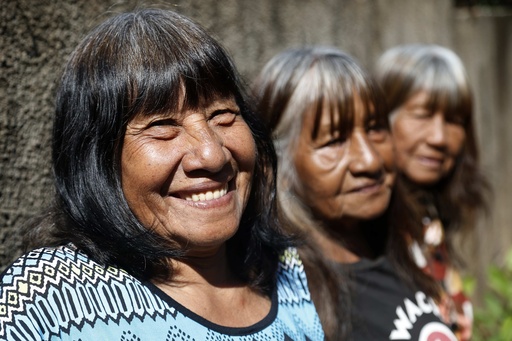
ASUNCIÓN, Paraguay — Many aspects of Maká culture are gradually diminishing, yet some elders from this Indigenous group in Paraguay retain memories of how their songs reflected the sounds of nature, particularly the calls of birds.
“Men would say that while they sang, they journeyed to places like Iguazu Falls or the mountains,” shared Gustavo Torres, a Maká educator residing near Asunción, the capital of Paraguay. “Their melodies were a reflection of the natural world.”
Beside him was Elodia Servín, a woman who communicates solely in the Maká language. With Torres interpreting for her, she revealed her cherished memories of vibrant dance celebrations in Fray Bartolomé de las Casas, a region that her people are striving to reclaim. Though uncertain of her age and marked by wrinkles, the recollection of dancing when she was healthy remains vivid in her mind.
The Maká are claiming rights over an 828-acre (335-hectare) area, which the Paraguayan government has largely disputed, as parts of the land have been allocated for a bridge construction connecting two cities over the Paraguay River.
For the Maká, the land known as Fray Bartolomé was given to them in 1944 through a decree from Higinio Morínigo, the then-president of Paraguay, as a gesture of appreciation for their bravery during the Chaco War against Bolivia in the 1930s.
“It’s sacred to us,” expressed Mateo Martínez, a 65-year-old Maká leader. “It was something we held dear, given to us by those who cared for us.”
According to Martínez, his ancestors played a critical role during the war by guiding soldiers and assisting them with nourishment and hydration. “Only the Indigenous people knew how to find water,” he stated. “If a Paraguayan soldier was lost there alone, he would surely perish.”
Despite the decree, the specifics regarding the land transfer were never documented, and although titles were issued in the 2000s, the Maká received less than half of the promised area. Government officials acknowledge a portion was designated for the community, but the dimensions and coordinates have never been precisely defined. While discussions for a new agreement take place periodically, no resolution has been reached thus far.
“We are willing to negotiate,” Martínez noted. “However, it seems the government either ignores us or misleads us.”
The Maká constitute one of Paraguay’s 19 Indigenous communities. In a nation of approximately 6.8 million residents, over 140,000 identify as Indigenous. The latest census from 2022 reported around 2,600 Maká living in various urban and rural regions.
Servín and approximately 1,600 other Maká reside in Mariano Roque Alonso, situated across the Paraguay River and not far from their cherished Fray Bartolomé. They were compelled to relocate in the 1980s due to flooding and have not returned since.
While the younger Maká generation now speaks Spanish, their native language remains vibrant, as evidenced by prayers inscribed in Maká near the Baptist church frequently attended by the community.
“Our elders had different beliefs back then,” Martínez recalled. “They revered the forces of nature and prayed to celestial bodies for health and bountiful harvests.”
One of the community’s cherished customs involves hosting a celebration when a young woman transitions into adulthood. During these festivities, men partake in chicha, a fermented corn beverage, or engage in traditional wrestling, while women, like Servín, contribute by singing.
“Our songs originate from our ancestors,” she expressed. “I aspire to pass them on to younger generations, including my daughters and granddaughters.”
Many Maká residents, such as Servín, earn their living through handicrafts, selling items like bags and embroidered goods.
Patricio Colman, 63, also hailing from Fray Bartolomé, crafts necklaces, bracelets, arrows, and bows. He reminisced about the dwindling of their traditional practices, saying, “When hunters existed, they would gather for hunting trips that lasted up to three months in the mountains. No one does that any longer.”
Colman noted the former structure within their community, where multiple leaders existed for various activities, including hunting, fishing, and dancing, whereas now, only Martínez remains as a leader of sorts. “Even back then, when officials visited, the territory distribution was always ambiguous, and there was a constant fear of encroachment.”
The Maká community not only mourns the loss of their homeland but also the separation from the graves of their ancestors in Fray Bartolomé. Among them is Juan Belaieff, a Russian soldier and cartographer who mapped the area during the Chaco War and was regarded by elders as a figure of reverence, serving as a bridge between their people and the divine.
“Believed to be a deity by our ancestors, he was deeply cherished and respected by our grandparents,” Martínez affirmed.
For outsiders, it may be challenging to locate their burial grounds as they lack traditional markers like tombstones or crosses, leading officials to question their claims.
“We are a unique culture,” Martínez explained. “When a Maká dies, we do not use crosses.”
The community traditionally digs graves for the deceased without ceremonies or marked headstones. Relatives dress the body in a cloak and personal items, finding solace in silence rather than ritual during their time of loss.
“Family members experience such profound sorrow that we refrain from ceremonies or comforting each other. It’s a moment of respect,” Martínez revealed.
Currently, the Maká inter their relatives at Quemkuket, situated about 11 miles (18 kilometers) from their settlement, yet they aspire to eventually gather their ancestors in a single resting place again.
“The Maká are resilient warriors, brave in spirit,” Martínez declared. “We have tirelessly fought for this cause for five to six years, and we will never relent.”

